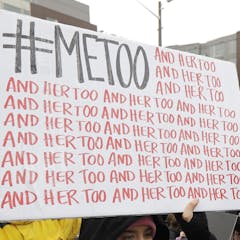
Articles on #MeToo
Displaying 1 - 20 of 275 articles

Public tragedies are heartrending events that gain widespread public attention. But where once prominent tragedies often brought Americans together, such tragedies no longer unify the country.

As #Metoo continues to unfurl in France, men are now also speaking up against abuse they experienced. The Conversation sat down with the country’s first sociologist researching this phenomenon.

A new study examines why women who report sexual misconduct often experience retaliation while men who are alleged perpetrators of sexual assault escape repercussions.

Non-disclosure agreements have been used to keep victim-survivors from speaking up. Despite guidelines addressing this, new research shows such agreements remain standard practice.

On Nov. 12, fashion mogul Peter Nygard was convicted of sexual assaults going back to the 1980s. Research shows that a delay in reporting sexual assault may not impact juries’ decision-making.

How will fans’ advocacy and commentary shape a reckoning about sexual assault and exploitation in the entertainment industry in Japan that has been exposed through the Johnny & Associates scandal?

As Hollywood continues to reckon with its past, Vivien Leigh’s story is a reminder of the challenges faced by women, even the most successful ones.

In minority faith groups that already face hate, women who have experienced harassment sometimes fear bringing negative attention to their community.

Myths about rape and assault persist even in the post-MeToo era.

Nearly two-thirds of female surgeons in the UK have been sexually harassed.

The nonconsensual kiss of team captain Jenni Hermoso has sparked a massive and instant rejection of machismo.

Examining the understandings of what ‘toxic femininity’ means to people can reveal insights about gender, power and the impact of language on health.

Anna Funder’s new book, Wifedom, is a meditation on the insidious nature of patriarchy. Funder draws parallels between our #metoo era and the time of George Orwell and his wife Eileen.

In the wake of the #MeToo movement, there has been a lot of focus on consent. However, that focus takes the spotlight away from other strategies that can better inform ethical sex.

So many of our artistic geniuses have complicated legacies. What do we do with work we love by artists whose behaviour is more difficult to admire?

The outrage misdirected at Lolita – and its author – does nothing to negate the realities it reflects. Reading Nabokov’s novel now raises questions about censorship, book banning and human nature.

This is a green light for creating the largest-ever compensation fund for sex abuse claims.

‘Tár’ shines a spotlight on the challenges of working in the ultraconservative world of classical music, including complex social issues such as misogyny, racism and homophobia.

Women resort to confidentially alerting co-workers, colleagues or classmates about harassment when they don’t trust the official channels for lodging complaints.

Sexual violence by police is more common than many might think. Failing to fully investigate can have a chilling effect on what is already the most underreported violent crime in Canada.
